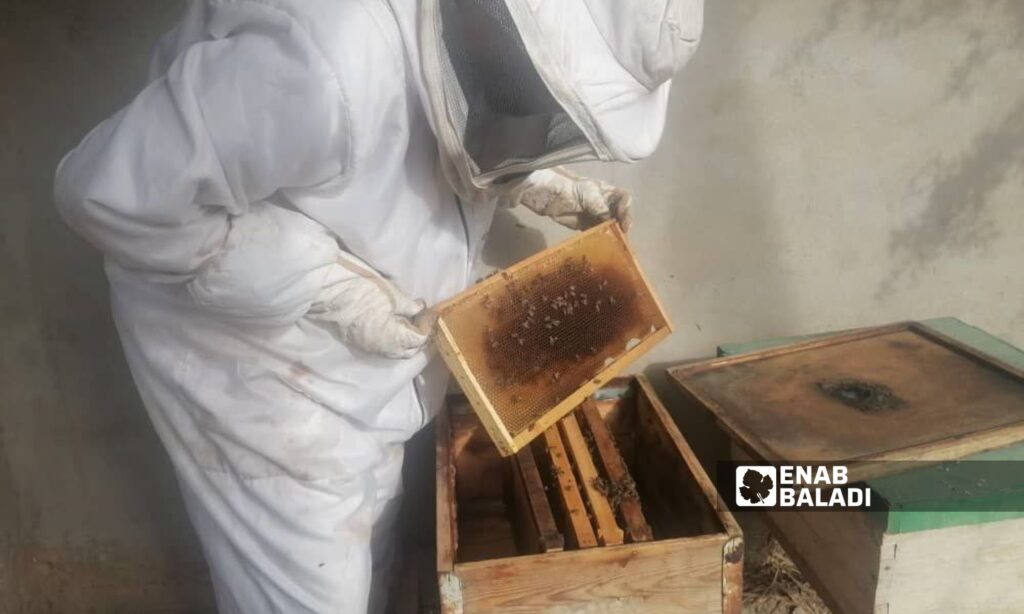Deir Ezzor – Obadah al-Sheikh
Beekeeping is one of the agricultural activities in Syria, and it plays a vital role in supporting the local economy, especially by providing high-quality bee products.
Beekeeping is gaining importance in the eastern Deir Ezzor governorate, especially in the areas under the control of the Autonomous Administration of North and East Syria (AANES), but natural pests directly affect this industry amid the absence of measures to assist apiary owners, whether from the AANES or local organizations, despite the large financial revenues they bring to the region.
These pests are represented by the spread of Merops (Bee Eaters) and rodents, specifically mice.
The town of al-Baghouz in the eastern countryside of Deir Ezzor is one of the best areas for beekeeping due to the presence of large agricultural areas on the one hand and its suitable climate on the other hand, according to beekeepers interviewed by Enab Baladi.
Riyad al-Ahmad, one of the al-Baghouz beekeepers, told Enab Baladi that natural pests directly affect beekeeping, and it is necessary to provide support that includes dispersers and medicines to combat them, to reduce the difficulties beekeepers face.
An agricultural engineer who works in the field of beekeeping, who requested to remain anonymous, told Enab Baladi that it is necessary to monitor the health of bees periodically and continuously to detect any diseases or pests that may affect them and that preventive or remedial measures can be taken if necessary to maintain the health of the hives.
Bee products are sold in the local market, and the price of a kilo of “Sidr” honey reaches 160,000 Syrian pounds (About $12), which reflects the high quality of the product, according to al-Ahmad, who pointed out that increasing production and expanding the local market can increase revenues as well as contribute to the trend to export Syrian bee products.
There are currently five apiaries in al-Baghouz, owned by al-Ahmad and other beekeepers, one of whom is Ali al-Abdallah, who spoke to Enab Baladi about the production difficulties that beekeepers face.
Al-Abdallah told Enab Baladi that the currently existing apiaries are primitive, but their development will contribute positively to expanding activity and increasing production, and thus increasing profits later, which will reflect positively on the beekeepers.
The absence of support for beekeeping comes despite the economic support it provides, with deteriorating living conditions similar to the various areas of influence over Syrian geography, while the areas controlled by the Syrian Democratic Forces (SDF) are considered the richest in Syria, as they contain most of the oil wells, in addition to being described as “Syria’s wheat reservoir,” due to the large agricultural activity there.
The people of the region continue to protest to demand the improvement of their living conditions and the provision of fuel. Previously, demonstrations took place to demand the provision of bread and sugar in the region’s markets.
Experience and tools
Beekeeper al-Abdallah focused on the importance of experience, tools, and boxes and the impact of climate on the success of the beekeeping process, especially in the spring and summer.
Beekeepers do not need to obtain licenses for beekeeping in the region, but the beekeeper pointed out the lack of available capabilities and the absence of any kind of support, whether from the Autonomous Administration or from other parties, and cooperation with specialized organizations will lead to improving production and raising revenues and developing the industry itself, according to al-Abdallah.
Deir Ezzor climate and beekeeping
Deir Ezzor governorate combines a desert climate with an agricultural land climate. The region witnesses temperature fluctuations and great drought in the summer, which is a suitable climate for beekeeping, which in turn is an important commercial activity in the region and an important opportunity to create projects of a sustainable nature. A set of conditions and steps must be met to obtain the best result.
The agricultural engineer who works in the field of beekeeping said that it is necessary to place the hives in locations protected from weather changes and extreme temperature fluctuations to protect the bees and their special supplies from harsh weather conditions.
Beekeepers must provide food sources for the bees during the winter by providing melted sugar or special bee food to help feed the bees when there are no sufficient natural sources of available nectar.
According to the agricultural engineer, attention must be given to the process of collecting honey and other bee products to maintain the quality of the products on the one hand and to ensure the safety of the bees on the other hand. These procedures also reflect the beekeeper’s skill and care for the products and bees.
Engineer Iyad Daboul, President of the Arab Beekeepers Union, Syria Branch, revealed a significant decrease in the number of beehives in Syria from 630,000 to less than 200,000 hives, as a result of the war, which led to a decline in production and a deterioration in the bee sector as a result of the difficulty of transporting the hives to various pastures, such as nectar flowers and plants, forests and agricultural crops.
Daboul told the official Syrian News Agency (SANA) that the support received by the beekeeping sector helped restore part of its pre-war status through “positive intervention and joint collective action” between the Ministry of Agriculture, the Syrian and Arab Beekeepers Union, and the United Nations Development Program (UNDP).

